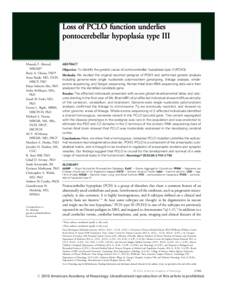وثيقة
Loss of PCLO function underlies pontocerebellar hypoplasia type III.
المعرف
DOI: 10.1212/WNL.0000000000001523
المساهمون
Chioza, Barry A., مؤلف
Rajab, Anna., مؤلف
Schmitz-Abe, Klaus., مؤلف
Al-Khayatyah, Aisha., مؤلف
Al-Turki, Saeed., مؤلف
Baple, Emma L., مؤلف
Patton, Michael A., مؤلف
Al-Memar, Ali Y., مؤلف
Hurles, Matthew E., مؤلف
Partlow, Jennifer N., مؤلف
Hill, R. Sean, مؤلف
Evrony, Gilad D., مؤلف
Servattalab, Sarah., مؤلف
Markianos, Kyriacos., مؤلف
Walsh, Christopher A., مؤلف
Crosby, Andrew H., مؤلف
Mochida, Ganeshwaran H., مؤلف
الناشر
Lippincott Williams and Wilkins.
ميلادي
2015-04
اللغة
الأنجليزية
الملخص الإنجليزي
Objective: To identify the genetic cause of pontocerebellar hypoplasia type III (PCH3). Methods: We studied the original reported pedigree of PCH3 and performed genetic analysis including genome-wide single nucleotide polymorphism genotyping, linkage analysis, whole-exome sequencing, and Sanger sequencing. Human fetal brain RNA sequencing data were then analyzed for the identified candidate gene. Results: The affected individuals presented with severe global developmental delay and seizures starting in the first year of life. Brain MRI of an affected individual showed diffuse atrophy of the cerebrum, cerebellum, and brainstem. Genome-wide single nucleotide polymorphism analysis confirmed the linkage to chromosome 7q we previously reported, and showed no other genomic areas of linkage. Whole-exome sequencing of 2 affected individuals identified a shared homozygous, nonsense variant in the PCLO (piccolo) gene. This variant segregated with the disease phenotype in the pedigree was rare in the population and was predicted to eliminate the PDZ and C2 domains in the C-terminus of the protein. RNA sequencing data of human fetal brain showed that PCLO was moderately expressed in the developing cerebral cortex. Conclusions: Here, we show that a homozygous, nonsense PCLO mutation underlies the autosomal recessive neurodegenerative disorder, PCH3. PCLO is a component of the presynaptic cytoskeletal matrix, and is thought to be involved in regulation of presynaptic proteins and synaptic vesicles. Our findings suggest that PCLO is crucial for the development and survival of a wide range of neuronal types in the human brain.
المجموعة
ISSN
0028-3878
URL المصدر
قالب العنصر
مقالات الدوريات

